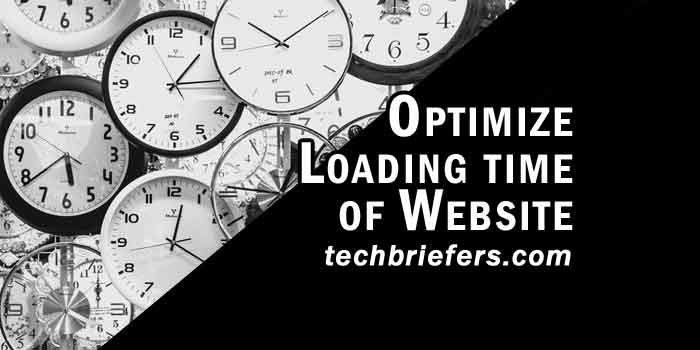Why optimize the loading time of a website

The loading time of a website is a very crucial aspect of web design. It always affects the website in various ways. For a good and optimized website, you must take care of loading time. This is why I am discussing “Reasons to optimize the loading time of a website”. Hopefully, this article will make you understand the importance of website optimization.
#1. Loading time
Do not underestimate the loading time of your website. Remember that on average 1 in 4 people leave your site immediately if it does not load in less than 4 seconds. The loading time is the first “barrier” that your visitors or customers may encounter.
On average, even if the average loading time of a web page reaches 6.17 seconds, the acceptance threshold for loading by Internet users is estimated at 2 seconds.
Optimizing loading time means taking care of your visitors.
#2. Challenge of mobiles and tablets
With the rapid increase in the rate of equipment in mobile devices, being efficient on a computer is no longer enough. Official figures show that more than 62% (62%-72%) of the world’s households are equipped with a tablet at present time in 2020.
To date, there are approximately 18% of the population in India uses smartphones and more than 3 billion worldwide in 2020. China, India, and the United States are the countries with the highest number of smartphone users.
You will understand, your loading time must absolutely be optimized on mobiles and tablets. Especially since cell phones have a slower loading speed and users are used to the fact that the sites they visit load as quickly on their mobiles as on their desktop or laptop computers.
Google is increasingly optimizing its algorithms for mobiles and tablets, so this point is particularly important.
#3. Search engine indexing
Poor performance, that is, a loading speed that is too slow, influences the total number of indexed pages.
Since robots have billions of pages to index each day, they don’t have time to “waste” on too slow sites, they need to optimize their own work. And if they haven’t crawled (browsed) an entire site, they don’t linger and move on.
Now, the complete indexing of your site by the engines is of course essential.
Conversely, a site with good performance, that is to say with a fast loading time, will be crawled and indexed in its entirety which will improve its referencing by the search engines because the engines will have all the information to interpret the site well.
Optimizing the loading speed of a site and therefore performance means improving behavior indicators: the number of pages that search engines crawl and index.
#4. Better user experience
To define the ranking of a site in its search results, Google would also take into account the behavior of visitors.
If a site is too slow to load, the behavioral indicators (the bounce rate, the average time spent on the site, and the number of pages visited) will be impacted and indicate to the search engines that ultimately your site is not relevant for search queries.
Optimizing the performance of your site, therefore, means optimizing Internet users’ behavior indicators.
#5. Make you want to come back
Note that less than 50% of users will return to your site if they have encountered problems such as the temporary unavailability of your site.
Optimizing the performance of your site means offering users a real experience so that they can convert and return later.
#6. Conversion rate
In order to increase your chances of converting a visitor into a customer, opt for the shortest possible response time to prevent your potential customers from leaving your website. Be aware that every second of waiting to load affects your daily conversion rate.
Optimizing the performance of your site means increasing your number of visits and sales.

Leave a Reply